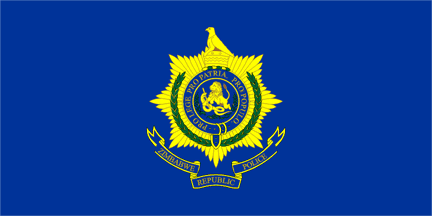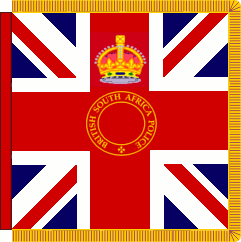 image by
Martin Grieve, 04 Apr 2008
image by
Martin Grieve, 04 Apr 2008
Last modified: 2009-06-27 by bruce berry
Keywords: zimbabwe | rhodesia | zimbabwe republic police | british south african police |
Links: FOTW homepage |
search |
disclaimer and copyright |
write us |
mirrors
 image by
Martin Grieve, 04 Apr 2008
image by
Martin Grieve, 04 Apr 2008
In 1970 when Rhodesia became a republic the crown was removed from the
crest and from the flag, although the name "British South Africa Police"
was retained until 1980.
Source: Flags and Symbols of Rhodesia, 1890-1980 (SAVA
Journal 5/96) by R Allport [all96].
Bruce Berry,
06 Feb 2002
In 1960 the crest was changed to a simpler design of the badge, closer
to that of the original medal design, and a crown was added above the badge.
The police flag was changed to incorporate the new crest, yellow with black
outlining and a yellow scroll with black letters, and at the same time
the colour of the field was changed to a brilliant shade of navy blue.
Source: Flags and Symbols of Rhodesia, 1890-1980 (SAVA
Journal 5/96) by R Allport [all96].
Bruce Berry,
06 Feb 2002
There were numerous variants of the police badge in use at different periods prior to the Second World War. In 1933 a crown was added above the badge to bring it in line with the badges of other colonial police forces.
In 1949 a new version of the badge was adopted and it was this version that was used on the first police flag, in the centre of a field of very dark blue. The crest showed the lion badge encircled by a scroll bearing the BSAP motto Pro Rege, Pro Lege, Pro Patria which can be translated as "For Sovereign, For Law, For Country", with another scroll below containing the words "British South Africa Police". This crest, yellow with dark blue lettering, was used until 1960.
The police flag contained the badge of the force on the centre of a royal
blue field.
An interesting feature of this flag is that the badge was cut out in detail and
then sewn onto the flag, so that all the details, including all the lettering,
are in fact the cloth of the field of the flag showing through the badge
Source: Flags and Symbols of Rhodesia, 1890-1980 (SAVA
Journal 5/96) by R Allport [all96].
Bruce Berry,
06 Feb 2002
 scan by
Bruce Berry, 04 Apr 2008
scan by
Bruce Berry, 04 Apr 2008
On 21 May 1884, the territory of Bechuanaland was declared a British Protectorate. A force of 100 men was organised to police the Protectorate and became known as the Bechuanaland Mounted Police. In 1885 a new force was raised and the name was changed to Bechuanaland Border Police. When the Eastern part of the Protectorate was transferred to the British South Africa Company (BSAC) in 1895, most of the men of this force were transferred to the BSAC Police. The badge of the Police at that time was in the colours red on blue, and showed a lion with tusk in the centre, surrounded by the words "The British South Africa Company Police", with the name finally changing to the British South Africa Police (BSAP) in 1898. The lion with tusk emblem came from the Arms of the British South Africa Company which had the responsibility of administering the territories which were later to become Northern and Southern Rhodesia.
After the occupation of Mashonaland in 1892 the BSACP underwent a name change to the Mashonaland Mounted Police and used as its badge simply a monogram of the letters MMP intertwined. This was also the acronym of the Matabeleland Mounted Police which was formed in 1894 to cater for a military presence in Matabeleland and it also used a monogram of the letters as a badge.
Following the transfer of the responsibility of the police forces from the Company to the High Commissioner, the British South Africa Police (BSAP) was formed from the Matabeleland and Mashonaland Mounted Police units on 22 August 1898. The badge adopted by the BSAP shows a charging lion (the "British Lion" and a reference again to that used in the BSAC Arms) with a spear in its chest, against a background of Mimosa bushes, with assegais and shields on the ground .
The BSAP kept its name following the granting of
Responsible Government to Southern Rhodesia in 1923.
Bruce Berry, 04 Apr 2008
The badge which later became the official BSAP badge and was featured
on all of the BSAP flags, was first used on the reverse of the medals awarded
to troopers who had taken part in the campaigns in Matabeleland and Mashonaland
between 1890 and 1897. The badge shows a charging lion (presumably the
"British Lion") with a spear in its chest, against a background of Mimosa
bushes, with assegais and shields on the ground.
Source: Flags and Symbols of Rhodesia, 1890-1980 (SAVA
Journal 5/96) by R Allport [all96].
Bruce Berry,
06 Feb 2002
There were numerous variants of the police badge in use at different periods prior to the World War II. In 1933 a Royal Crown was added above the badge to bring it in line with the badges of other colonial police forces.
In 1960 the crest was changed to a simpler design of the badge, closer to that of the original medal design, but with the Royal (St Edward’s) Crown added above the badge. The police flag was changed to incorporate the new crest, being in yellow with a black outline with a yellow scroll with black letters below.
In 1970 when Rhodesia became a republic the crown
was removed from the badge and also from the flag, although the name "British
South Africa Police" was retained until 1980. There was no change to the name
of the force or the flag during the short-lived period between June 1979 and
April 1980 when the country became know as Zimbabwe-Rhodesia.
Bruce Berry, 04 Apr 2008
British South Africa Police banner
 Image by Herman Fmy, 10 May 2009
Image by Herman Fmy, 10 May 2009
The British South African Police banner was a
square Union Flag.
"The Regiment received, along with fifty-one other units, a Banner, presented to
the Regiment by Lord Milner on behalf of King Edward VII at
Mafeking in 1904 in
recognition of services rendered to the British Empire. It was stated
specifically at the time that the Banner was not a Regimental Colour. Despite
this, the Banner was mistakenly used in place of a Colour and with an
embroidered Battle Honours, but this action was not sanctioned by official
regulations." (Source: Field, Andrew, The Abbreviated
Website History of the British South
Africa Police).
Herman Fmy, 10 May 2009
According to Richard Allport in Flags and Symbols of Rhodesia 1890 - 1980 (SAVA Journal 5/96) [all96] this flag was made of silk with the BSAP badge in the centre. When the then Commissioner, Col. Billy Bodle, went to Mafeking to receiver the banner, he was convinced that he was receiving a "King's Colour". For the next 18 years it was treated as such and in1922 a replacement was requested. The War Office in Britain, however, replied that they had no record of a King's Colour having been awarded to the BSAP. A lengthy enquiry ensued and continued until 1936 when the Coronation Contingent was due to leave for England. The Army Council then ruled that the "flag presented to the BSAP in 1904 was a banner given in recognition of services rendered to the Empire. It was not a Colour and battle honours were not allowed to be emblazoned on it".
Most members of the BSAP nevertheless continued
to regard this flag as a "Colour".
Bruce Berry, 24 June 2009